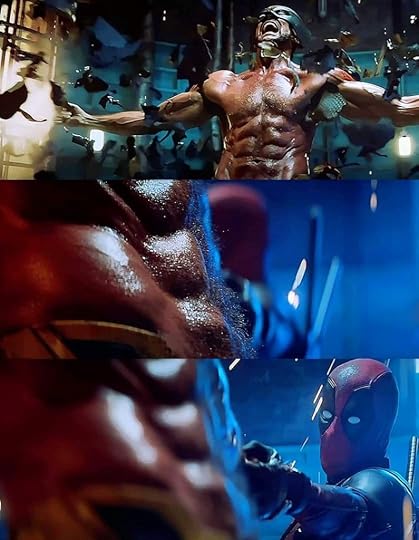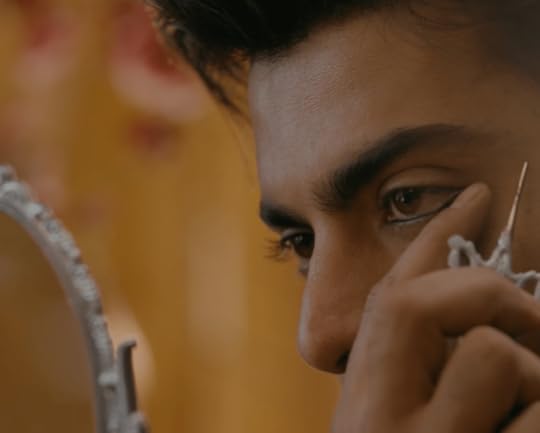Wolverine Kaku and Other Pleasures
I’m starting a fortnightly column with Hindustan Times, titled D for Drama. Having been spoiled by the internet in recent years, I really struggled to stick to the word count while writing this first column. Here’s to rediscovering the discipline and succinctness that print demands of writers in time for the next column. For now though, here’s the unedited version (you can read the edited column here):
It’s a morning show of Deadpool and Wolverine in the middle of the week, but this cinema in south Kolkata is almost full. In the queue for 3D glasses, a young man is on the phone. “Right now there’s an important family event that I can’t get out of, but I’ll be available after lunch,” he says. When he hangs up, his companion teases, “Family event, huh?” The young man solemnly replies, “I’m here to pay my respect to Deadpool-da and Wolverine kaku.” “Da” being the diminutive form of “dada” meaning older brother and “kaku” meaning uncle in Bengali.
I lost sight of this distant relative of Deadpool and Wolverine once inside, but he must have contributed to the resounding cheer that filled the darkened room when Hugh Jackman finally lost his shirt in the film’s predictable climax. Deadpool and Wolverine is more of a mediocre comedy special by Ryan Reynolds than a film, but the bar is low for superhero movies these days and Reynolds’s real-life superpower is marketing. Until the first Deadpool film made $782 million(ish), no one thought this character would strike a chord with audiences. Yet watching Reynolds play him, it’s makes perfect sense that a trash-talking motormouth who presents himself as a truth teller is so wildly popular in this era of trolling and internet personalities.
For many today, social media handles are akin to Deadpool’s superhero suit, simultaneously offering anonymity and a distinctive persona. The virtual world is performative, but it values honesty above (almost) everything else. Online performances and virality may be steeped in artifice, but despite this they often end up platforming uncomfortable truths. Deadpool embodies (via Reynolds’s muscular physique) precisely this multiplicity, especially in this latest outing in which Reynolds deliberately blurs the boundaries between punchlines and life experiences. From savagely running down his past films to cracking jokes about Jackman being a divorcé, Deadpool turns reality into a card trick. He’s as honest as he is deceptive — and the fans love it.
If you wait for Deadpool and Wolverine to arrive on streaming, you’ll miss what makes it fun — the experience of watching the film with fans who react volubly to whatever shows up on screen. It doesn’t matter if you haven’t followed the saga of the Fox and Disney deal, but you will grin at the jokes Reynolds cracks at the their expense because of the surrounding laughter. Similarly, you may not give two hoots about whether Henry Cavill is the next Wolverine, but when Deadpool promises “Cavillrine” he’ll be much better treated by Marvel (a reference to Cavill being unceremoniously dropped by Warner Bros), you’ll probably crack a smile.
And when Wolverine stands shirtless before you, you will add to whatever noise the audience is making to express collective lust, adoration and visceral acknowledgement that the path to a body like Jackman’s is not paved with fish fry, biriyani and mishti. Even if you called him “Wolverine kaku” 120 minutes ago. Uncle can stay standing; we’ll all be seated.

Culturally speaking, there seems to be a skittishness we feel about depicting older men as desirable. It’s tempting to imagine this is the net result of feminists pointing out how power imbalances between genders have been normalised and romanticised. However, it’s more likely that being desirable still doesn’t come with associations of respect and veneration. Conventionally, it’s been associated with sin and femininity. God forbid we tar men who are effectively the elders of our societies with that brush (insert outraged gasp here). At the same time, who doesn’t want to feel desirable? Topping the list of those who do are ageing men, haunted by the spectre of becoming irrelevant.
This is possibly why we’re now getting so many films in which heroes establish their desirability through feats of physical strength that are graphically violent, but also involve a striptease-like unveiling of the body. It’s unerringly similar to how the virility of a romantic hero (usually, a younger man) is showcased using the device of a love scene. Both flash their bodies and for the same reason — to entice the viewer — but the mood is starkly different. The hero of a romance is one we’re encouraged to (respectfully) objectify. When the hero is an older man, the genre is invariably action and desire is sublimated so that it can appear disguised in violence. Just think of how everyone’s hormones erupted at the sight of the wrinkled ‘zaddy’ Shah Rukh Khan in Jawan, whose action scenes are choreographed to showcase the actor at his sexiest. When the silver foxes aren’t ready to retire and can flex the muscle of a loyal fanbase in a way younger, less-established heroes can’t, action movies seem to be the safest option. (Deadpool teases Wolverine that he’ll be doing these movies till he’s 90, but chances are higher that this would also be Reynolds’s fate, given Deadpool is a masked hero.)
Fighting is very much the love language in Deadpool and Wolverine; so much so that thanks to one particularly spectacular fight scene, the Honda Odyssey has become to gays what U-Haul is to lesbians (or so Tumblr informs me). Unleashed by the film’s R rating, Deadpool is committed to poke you in the eye with the subtext, using his commentary to decode every tight close-up and innuendo-laden dialogue. Yet despite being anchored by a gleefully foul-mouthed hero, to protect tender sensibilities from being unsettled by the film’s erotic and homoerotic possibilities, Deadpool also falls back on comedy. Now, that moment when you felt tingly is a build-up to a punchline, rather than a tricky moment that holds a mirror up to your longings. Phew!
A rare recent work that leans comfortably into desire for the male body is Asim Abbasi’s show Barzakh, starring Fawad Khan and Sanam Saeed among others. The six-episode show quickly unravels into becoming unwatchable, but it begins with a gorgeous sequence, in which cinematographer Mo Azmi and actor Khushhal Khan perform the extraordinary feat of making the thin moustache seem impossibly sensual. Desire is a dangerous, forbidden thing in Barzakh, but Abbasi and Azmi celebrate it through beautiful, fragmentary moments, like the scene in which a young boy watches a man bathing or when Fawad puts kajal in his eyes.

The show’s production design and cinematography are its saving graces even though they ultimately can’t compensate for Barzakh‘s misguided attempts at being poetically layered and intelligent. Yet every now and then, breaking the tedium of its overwrought storytelling, are portraits of tenderness and longing between men. The show’s infatuation with beauty give the viewer some exquisite, unsettling moments. Moments that turn two-dimensional visuals of a scene into something almost tactile; all because of a gaze framed by desire.
When it comes to the small, more private screen for streaming entertainment, romanticism remain audience favourites across the world. Maybe it’s the way desire reveals our vulnerabilities or the way it levels the unevenness of the patriarchal playing field, but box office numbers suggest that when they’re in the cinema, in the company of strangers, audiences feel more comfortable with heroes who lash out rather than those who sit with their longings (perhaps thus nudging us to collectively do the same?). Still, it’s heartening to know that even in the middle of all things bland and messy, Wolverine kaku and others are taking moments to give us the pleasure of nainsukh.
Deepanjana Pal's Blog
- Deepanjana Pal's profile
- 34 followers



